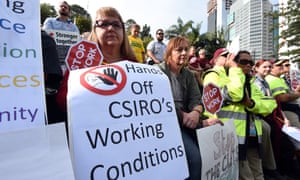The use of private email by senior staff to discuss job cuts at the CSIRO “looks like dubious administration” and may be a breach of its code of conduct, the Senate clerk has said.
The assessment has prompted the Senate committee examining CSIRO job cuts to signal it will ask the auditor general to investigate senior officers’ use of private email.
On Friday, Peter Craig, the director of the CSIRO’s weather research collaboration with the bureau of meteorology, told a Senate committee at least seven people in the CSIRO’s ocean and atmosphere division had used private emails to discuss job cuts because they were directed to do so.
In response to a question on notice he added that it was the oceans and atmosphere division director, Ken Lee, and the deputy director, Andreas Schiller, who had given the verbal direction on 28 November.
The CSIRO claimed it was meeting record-keeping obligations despite use of private email because it would ensure the emails were entered into its system.
In a letter released on Thursday, the Senate clerk, Rosemary Laing, wrote to the Senate committee investigating CSIRO cuts raising concerns about the propriety of using private emails, even if later entered into records.
“Although this subsequent ‘capture’ of the records originally conveyed by private email may not be contrary to the requirements of the Archives Act (or national security), it looks like dubious administration and may be a breach of the organisation’s code of conduct by senior staff,” she said.
The code states CSIRO staff must maintain “complete, reliable and accurate records of the performance of your work-related decisions and activities” and “ensure the proper storage of, and access to, records, including the confidentiality and security of information”.
Laing said: “Furthermore, it has understandably led to concerns that it may create difficulties for the Senate or its committees to seek information.”
The Greens senator Peter Whish-Wilson, chair of the Senate budget scrutiny committee, raised that concern at its 8 February hearing. He said “clearly, if private emails have been used, it is going to be very difficult for us to access information” about an executive meeting that decided to make 350 positions redundant.
“It is very concerning that there is no transparency around this if private emails have been used.”
On Wednesday, Whish-Wilson told the Senate full production of documents was needed to assess CSIRO’s restructure and reprioritisation and “to reverse these cuts to the best climate scientists in the world and to increase funding to this critical area of public good science”.
The opposition’s innovation, industry and science spokesman, Kim Carr, told Guardian Australia he was “deeply concerned that there is a case to answer as to why CSIRO staff were directed to use private emails”. He said this arguably breached two record-keeping laws and the CSIRO code of conduct.
“Given the Senate clerk’s assessment that this action is ‘dubious administration’ the Senate committee will now seek to have the auditor general investigate the matter.”
Carr said: “There are still serious questions of public-sector administration that CSIRO needs to answer.
“How many people were involved? Who issued the directive? What access was there by third parties? How can we be certain the information has been returned to the CSIRO and is secure?”
CSIRO denied there was a directive to use private emails.
At an earlier Senate committee hearing Alex Wonhas, the CSIRO’s environment, energy and resources executive director, said private emails were used to plan job cuts to ensure “information stays within a small group of people to not cause distress and concern among staff”.
On Wednesday the cabinet secretary, Arthur Sinodinos, told the Senate he had advice from the attorney general’s office and finance department that CSIRO officials had not breached their obligations.
“CSIRO senior staff have been reminded of the policy regarding the private use of emails,” he said. “If there are further concerns, these are best raised directly with the CSIRO, who are an independent authority with full responsibility for these matters.”




